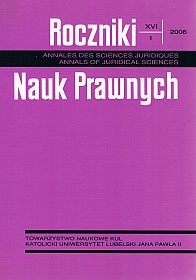Infliction of Punishment by the Extrajudicial Decree – Between the Norm and Its Application
Abstract
Canon 1342 of the Canon Law Code of 1983 provides: «§ 1. Whenever legitimate reasons disturb a court trial, the punishment may be inflicted or declared by an extrajudicial decree. Punitive measures and penance may be inflicted by the decree in every case. § 2. Punishment permanently binding as well as punishment that may not be inflicted because of the regulations in the act or order establishing it, may not be inflicted by the decree».
Application of the above presented regulations during the 20 years when the Canon Law Code/1983 has been binding encounters numerous difficulties. All this causes that there is a discrepancy between the established norm and practice. The first question concerns the relations between the judicial and extrajudicial procedures of inflicting punishment. Still there is no unanimity with respect to whether the trial is the usual way of inflicting punishment, or only the procedure preferred by the legislator. If the court trial is only the recommended and preferred way of inflicting punishment, the ordinary has a much broader range of confidential power making it possible to choose the administrative procedure, as also this one appears to be the “usual” one. However, in the case when the court trial will be defined as a usual one, referring to extrajudicial infliction of punishment will indeed be exceptional. Such ambiguity in the interpretation of Canons 1341 and 1342 in the practice of the Church's life leads to preference for the former possibility, which ultimately results in court trials being quite rare.
This issue is inextricably joined to the question of “legitimate causes” that should disturb (obstent) holding a court trial. Hence, according to the code, only when the court trial cannot be held or there are serious difficulties in holding it, the administrative procedure may be referred to. However, it is quite different in practice. The above mentioned causes are often only ones that suggest using the extrajudicial procedure, and the few canon punishments are often inflicted by an extrajudicial decree without previously deciding whether there exist any causes that authorize one to use it. This kind of discrepancy does not result from failings or inner faults in the penal legislation, but frequently from underestimating or neglecting its application, even in the most serious cases. It seems that the borderline between love, tolerance, negligence, ignorance, indifference and permissiveness is not defined precisely enough and taken into consideration.
Despite the lack of a closely defined procedure to use when inflicting punishment by an extrajudicial decree, the ordinary should make sure that the accused, informed in the proper way about the offence he is charged with, has the time to prepare his defense, using – if necessary – the help of a barrister, to present his arguments as the last one during one or several audiences, to be, according to the law, reprimanded, and to be able to refrain from obstinacy. Only at the final stage of such a procedure may the ordinary ex actis et probationis inflict punishment, after previously becoming morally sure, in the degree equal to that of the judge in the court trial. Unfortunately, we know that the practice of inflicting punishment often departs from the norm defined by the legislator.
Despite the precisely worked out regulations concerning both the punishment (in genere) and the court trial as poenas applecandas (in specie) their application is not unambiguous. Hence the way remains open for the post-code legislation, both universal and particular, to bring the code procedure to revision, or at least to cause the court rather than administrative procedure to be more often used in practice.
Copyright (c) 2006 Roczniki Nauk Prawnych

This work is licensed under a Creative Commons Attribution-NonCommercial-NoDerivatives 4.0 International License.


